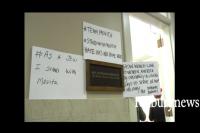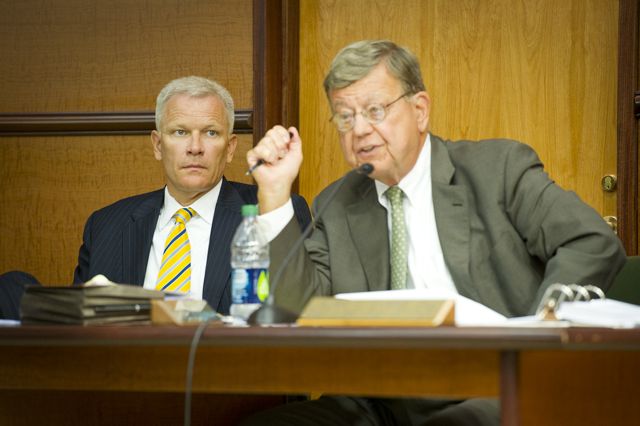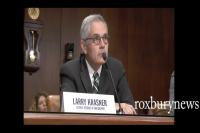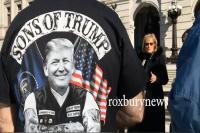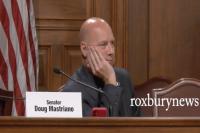As released by the U.S. Department of Justice.
Peter J. Smith United States Attorney Middle District of Pennsylvania.
April 23, 2014
NEWS RELEASE
INDICTMENT UNSEALED CHARGING PENNSYLVANIA MAN AND TWO ADDITIONAL INDIVIDUALS WITH CONSPIRACY TO ILLEGALLY EXPORT RESTRICTED CHEMICAL LABORATORY EQUIPMENT TO SYRIA.
The United States Attorney’s Office for the Middle District of Pennsylvania, U.S. Immigration and Customs Enforcement (ICE), Homeland Security Investigations (HSI) and U.S. Department of Commerce, Bureau of Industry and Security, Office of Export Enforcement announced today the unsealing of an indictment charging three individuals, including Ahmad Feras Diri, age 39, of London, United Kingdom, Harold Rinko, age 72, of Hallstead, Susquehanna County, Pennsylvania, and Moawea Deri, age 36, a Syrian citizen, and a firm with which Ahmad Feras Diri and Moawea Deri were associated, for their alleged involvement in a conspiracy to illegally export laboratory equipment, including items used to detect chemical warfare agents, from the United States to Syria, in violation of federal law.
The indictment alleges that federal legislation and export controls seek to shut down the supply chain used by the Syrian state to support terrorism and to develop and proliferate weapons of mass destruction, including chemical weapons. Pursuant to regulations of the U.S. Department of Commerce’s Export Administration, a license is required to export goods and services from the United States to Syria, other than limited and certain categories of humanitarian food and medicine.
According to U.S. Attorney Peter Smith, the indictment, returned by a Scranton grand jury on November 20, 2012, and sealed until today, charges the three individuals and the company with criminal conspiracy, wire fraud, illegal export of goods, money laundering, and false statements.
According to Homeland Security Investigations Philadelphia Special Agent in Charge (SAC) John Kelleghan, Commerce Department Office of Export Enforcement New York Filed Office SAC Sidney Simon, and the United States Attorney’s Office, Ahmad Feras Diri was arrested by the Metropolitan Police in London on March 14, 2013, and is facing extradition to the United States in connection with the charges in the Middle District of Pennsylvania. Harold Rinko, of Hallstead, Pennsylvania, previously waived arraignment on the sealed indictment. The government has also filed a plea agreement with Rinko which is subject to the approval of the Court. Rinko, the owner-operator of Global Parts Supply, was allegedly engaged in the export business. Ahmad Feras Diri and Moawea Deri are brothers in the business of purchasing and transferring goods from the United States to Syria through a firm known as d-Deri Contracting & Trading. Moawea Deri, remains at large, and is considered a fugitive.
The indictment alleges that, from 2003 until the date of the indictment, the three men conspired to export items from the United States through third party countries to customers in Syria, without the required U.S. Commerce Department licenses.
According to the indictment, the conspirators prepared false invoices which undervalued and mislabeled the goods being purchased and listed false information as to the identity and geographic location of the purchasers of the goods. The indictment alleges that the items were to be shipped from the United States to Jordan, the United Arab Emirates and the United Kingdom, and thereafter transshipped to Syria.
According to the indictment the items allegedly included: a portable gas scanner used for detection of chemical warfare agents by civil defense, military, police and border control agencies; a handheld instrument for field detection and classification of chemical warfare agents and toxic industrial chemicals; a laboratory source for detection of chemical warfare agents and toxic industrial chemicals in research, public safety and industrial environments, a rubber mask for civil defense against chemicals and gases; a meter used to measure chemicals and their composition; flowmeters for measuring gas streams; a stirrer for mixing and testing liquid 2 chemical compounds; industrial engines for use in oil and gas field operations; and a device used to accurately locate buried pipelines.
The case was investigated by HSI in partnership with the Department of Commerce, Office of Export Enforcement. “HSI will use all resources at its disposal to prevent sensitive and restricted technology from being exported to Syria though the black market,” said SAC Kelleghan. “No good comes of illegal exports to Syria during this time of gross misgovernment and civil strife, and HSI will do all in its power as the principal enforcer of export controls to ensure that sensitive technology doesn’t fall into the wrong hands in Syria. I applaud our colleagues at the Department of Commerce, along with our law enforcement counterparts in the United Kingdom, who helped us make this complex investigation a success.”
Special Agent In-Charge Simon cited the close cooperation of Federal law enforcement agencies throughout the case. “I commend our colleagues from HSI and the United Kingdom, and the U.S. Attorney’s Office, for their outstanding work with the Commerce Department on this case. Our special agents work tirelessly every day to pursue those who flout our export control laws and attempt to supply anyone with technology that threatens our national security. OEE will seek and arrest violators wherever located, worldwide, and we will continue to leverage our unique authorities as the only federal law enforcement agency exclusively dedicated to enforcing dual-use export violations,” he said.
The case is assigned to Assistant U.S. Attorney Todd K. Hinkley and Mariclaire Rourke, Trial Attorney with the Department of Justice, National Security Division, Counterespionage Section.
Indictments are only allegations. All persons charged are presumed to be innocent unless and until found guilty in court. A sentence following a finding of guilty is imposed by the Judge after consideration of the applicable federal sentencing statutes and the Federal Sentencing Guidelines.
Under the Federal Sentencing Guidelines, the Judge is also required to consider and weigh a number of factors, including the nature, circumstances and seriousness of the offense; the history and characteristics of the defendant; and the need to punish the defendant, protect the public and provide for the defendant’s educational, vocational and 3 medical needs. For these reasons, the statutory maximum penalty for the offense is not an accurate indicator of the potential sentence for a specific defendant. ****







